|
|
|
Sort Order |
|
|
|
Items / Page
|
|
|
|
|
|
|
| Srl | Item |
| 1 |
ID:
079893
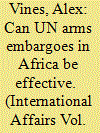

|
|
|
|
|
| Publication |
2007.
|
| Summary/Abstract |
Calls in 2007 for new UN sanctions on Iran and Burma reflect a current swing back in favour of using sanctions as a way of putting pressure on a regime without resorting to direct military engagement. This article assesses the effectiveness of UN sanctions in Africa and in particular of the most commonly imposed form of sanctions-the arms embargo. The article argues for an analysis of what sanctions achieve and suggests that for the most part UN embargoes have not stopped weapons reaching Africa not only because of the lack of capacity to implement them in some states, but also because of the lack of political will in others. In some post-conflict situations such as Liberia, UN sanctions have been adapted to support economic reconstruction and security sector reform effectively. However, in the future there is likely to be a decrease in the use of UN sanctions in Africa but an increase in their use by the Africa Union and some of Africa's Regional Economic Communities
|
|
|
|
|
|
|
|
|
|
|
|
|
|
|
|
| 2 |
ID:
076826


|
|
|
| 3 |
ID:
060982
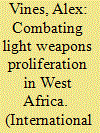

|
|
|
|
|
| Publication |
Mar 2005.
|
| Summary/Abstract |
Light weapons proliferation is a serious problem in West Africa. A regional moratorium on imports of small arms and light weapons has not worked and UN arms embargoes on Sierra Leone, Liberia and Côte d'Ivoire have had limited impact. The Economic Community of West African States is currently drafting a new binding legal instrument aimed at controlling flows in West Africa but this will only succeed if the heads of state and government seriously adopt it. This needs to include greater compliance of UN sanctions, international reform of the End User Certificate system, mapping the spread of artisan production and an examination of ammunition imports to West Africa. Better control of ammunition imports in particular may assist the combat of light weapons proliferation as well as the comprehensive destruction of weapons from disarmament efforts. The illicit weapons trade in West Africa is increasingly transnational and it requires regional and international cooperation and support to combat it.
|
|
|
|
|
|
|
|
|
|
|
|
|
|
|
|
| 4 |
ID:
148462
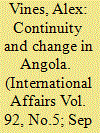

|
|
|
|
|
| Summary/Abstract |
Angola may be entering a pivotal moment, triggered by persistently low oil prices and its president José Eduardo dos Santos (the world's second longest-serving president) signalling that he may step down in 2018. Will this result in continuity or change? This review article of six books on modern Angola shows that since 1820, significant dips in international commodity prices have marked moments of lasting political change in the country. They also show that the history of Angolan nationalism is one of deep divisions and that political loyalty and support were often more about survival or ambition than about ideology and ethnicity. Throughout modern Angolan history personalities, such as Agostinho Neto, Jonas Savimbi and José Eduardo dos Santos, have also played a critical role in determining the country's fortunes. The single greatest foreign influence on Angola might be Cuba's ‘internationalist solidarity’ of sending up to five per cent of its population to Angola between 1976 and 1991 in support of the Movimento Popular de Libertação de Angola (MPLA). Over a decade later, the Chinese also found that the MPLA government determined their partnership. This review article examines the strength of Angolan agency and how the drivers of change are complex, determined by personality politics, geopolitics, prestige, solidarity, cost–benefit analysis and timing.
|
|
|
|
|
|
|
|
|
|
|
|
|
|
|
|
| 5 |
ID:
119440
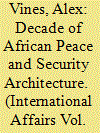

|
|
|
|
|
| Publication |
2013.
|
| Summary/Abstract |
This article examines how the African Union (AU) has handled Africa's peace and security challenges since 2002, defines what has been successful and what remains aspirational. It does so by examining how the AU has responded, from using sanctions against coups, to deploying peacekeeping missions and mediating in conflicts.
An African Peace and Security Architecture (APSA) has developed since 2002, including a Peace and Security Council, an African Standby Force, a Continental Early Warning System and a Panel of the Wise. This sounds impressive, but the operationalization record is patchy: AU-deployed missions have been fully dependent on external donors; harmonization is a major problem; serious questions remain over AU capacity; and some of the Regional Economic Communities (RECs) are developing at a quicker pace than the AU.
Given these circumstances and its internal capacity deficit, the AU will likely struggle to exercise oversight of regional processes, including the development of regional standby force arrangements. APSA is clearly based on a liberal peace model, yet democratic systems, respect for human rights and good governance aren't always in place in African countries, and the self-interest of elites continues to be a constraint on APSA and its success.
Over the last decade the AU has found a voice and, despite some setbacks, it has shown through AMISOM in Somalia that it is capable of conducting a successful peacemaking operation. Its biggest challenge is not making the decision to intervene or deploy forces, but the capacity of most African states to deploy effectively. APSA's dependence on external partners needs to diminish over the next decade if better African solutions are to be found to peace and security challenges in the continent. Yet, the internationalized nature of crises such as the one in Mali in 2012-13 requires international partnerships.
Not all of Africa's security problems can be solved by Africa alone, but APSA does provide a vision framework for African and external partnership.
|
|
|
|
|
|
|
|
|
|
|
|
|
|
|
|
| 6 |
ID:
097088
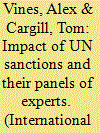

|
|
|
| 7 |
ID:
123159
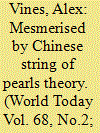

|
|
|
| 8 |
ID:
152657


|
|
|
| 9 |
ID:
124446
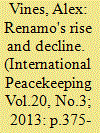

|
|
|
|
|
| Publication |
2013.
|
| Summary/Abstract |
Mozambique celebrated 20 years of peace in 2012. Renamo was a successful guerrilla force that mostly demobilized and disarmed. It also contested four presidential and parliamentary elections. Renamo became the largest opposition party in Africa until, 2002 but has since been less successful due to exclusion politics by the party of government Frelimo, and because of tactical mistakes by Afonso Dhlakama, Renamo's leader for 33 years. This paper argues that Dhlakama's leadership was critical in bringing an end to the conflict and delivering Renamo's demobilization, but he was unable to tactically change from a guerrilla mentality. Dhlakama's decision to return to rural central Mozambique in late 2012 and the armed violence that followed in 2013 was out of political desperation. Renamo lacks the support or resources to return Mozambique to civil war, and a splinter party, Movimento Democrático de Moçambique, has benefited.
|
|
|
|
|
|
|
|
|
|
|
|
|
|
|
|
| 10 |
ID:
099560
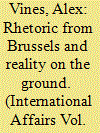

|
|
|
|
|
| Publication |
2010.
|
| Summary/Abstract |
This article overviews the development of African Peace and Security Architecture (APSA) to date and examines EU involvement in this. The European Union is the major financial partner in both military and non-military assistance to the African Union (AU). Europe has shifted from being a major UN troop contributor towards the funding of African-led peace operations, as well as the emergence of time-limited, high-impact, missions. With the exception of Somalia, these ESDP operations have provided little direct security benefit to Europe and their success has been limited. They have provided experimentation opportunities of ESDP capabilities in the Democratic Republic of Congo, Chad and Guinea Bissau. Events in the eastern Congo in late 2008 demonstrate that the EU needs to consider carefully when it intervenes militarily in Africa: non-intervention and coordinated bilateral diplomatic efforts by EU member states can be more effective.
|
|
|
|
|
|
|
|
|
|
|
|
|
|
|
|
| 11 |
ID:
054074
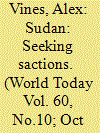

|
|
|
|
|
|
|
|